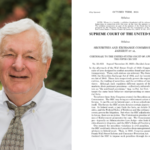The Curious Case of the James Brown Estate
Great musicians are larger than life, and the most iconic of them become members of an elite musical monarchy: Michael Jackson was the King of Pop, Aretha Franklin was the Queen of Soul, and Prince Rogers Nelson was Prince. Similarly, James Brown, the inventor of funk music, landed a seat at this table of legendary musicians. Although lacking a royal honorific, James Brown was “the Godfather of Soul.” The Godfather of Soul, though, shared more than musical prowess with these other iconic musicians. The estates of James Brown, Michael Jackson, Aretha Franklin, and Prince all continue to face legal obstacles—years after their deaths—many of which revolve around the artists’ copyright interests . . . .









